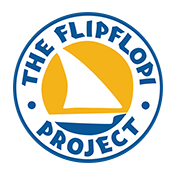Closing the Loop on Waste Plastics Through Heritage Boat Building
In Lamu Kenya, waste management is next to non-existent while populations rise and the ocean continuously washes more plastics onto its shores, but now we’re working to do something about it.
With inadequate waste management, a pile up of trash pollutes our environment
Coastal communities globally are awash with plastic, due to both the increasing dependence on plastics and lack of sufficient waste management infrastructures.
Within the last three decades, more single-use packaging and products have been introduced and the demand has grown, however, global waste management systems have not. In Lamu, this is illustrated by an annual beach clean-up on a 12-km stretch of beach. On average they collect between 35-40 tonnes of plastic waste annually. To exacerbate the problem, there is only one waste disposal site on Lamu Island to cater for a population of 30,000. This area has no separation facilities and waste is left to pile up, blow across the island and into the ocean and in many instances is burnt openly.
Because many coastal communities and islands such as Lamu remain isolated from major towns and transport arteries they tend to be cut off from large-scale operations to dispose of and manage recyclable waste due to the cost of transport. Instead, community-based organisations have begun working to tackle the issue. However, these organisations have extremely limited capacity due to scope, funding and support. There are no cost-effective mechanisms to transport recyclable materials to the mainland. This means communities must be empowered to reduce plastic consumption and embrace a locally-led closed-loop waste management system.
The work of community-led organisations has shown us that the answer to dealing with plastic pollution is to find a way to manage waste within a locally relevant context.
What we are doing…
We’re building on the success of building the world’s first recycled plastic sailing dhow by establishing a Heritage Boat Building Training Centre to design and construct recycled plastic sailing vessels with local boat builders based on indigenous heritage, knowledge and skills.
To ensure long-term sustainability, we have established a community-led network and first-of-its-kind recovery and recycling centre to establish a ‘closed-loop’ post-consumer waste management practice. The Material Recovery Facility serves the entire archipelago, connecting communities and creating networks to build a supply chain consisting of community waste sellers, segregators, transporters, and site staff who will collect, sort, wash and shred the plastic waste. We're developing this network through skill-sharing workshops and educational outreach.
To tackle the continued dependence on single-use plastics within the community we must continually conduct outreach to reduce plastic use, identify recycled plastic products that are desirable and map the plastic waste hotspots to reduce its impact on the marine and coastal environment.
Since the project began in 2022, we have found that many of the plastics collected are recyclable on-site, so various products including artisanal furniture and sailing boats are being developed for the local market. We hope to create a long-term market for these recycled products assuming the collection, sorting and preparing of plastics can provide a regular guaranteed supply of adequate quantities of waste plastics for reprocessing and recycling.
We are targeting the boat building market to offer alternative boat building material other than the traditional hardwoods that have been used. In recent years, the cost of quality hardwood is constantly increasing in price and diminishing in availability while maintenance costs of wooden boats are extremely high. However, as plastic has shown us, it is for life. Our original Flipflopi prototype has shown that maintenance costs are minimal while building and material costs are similar, therefore, recycled boat building offers a cost-effective and environmentally friendly solution to the plastic pollution problem that retains cultural heritage.
Our Impact
We’re tackling today’s marine ecosystem health challenges through combining indigenous knowledge and modern innovation, through the construction of traditional sailing vessels and other local products including artisanal furniture from plastic waste.
To date, we have 30 employees, a collection network of several hundred individuals as well as community based organisations, which has culminated in over 200,000 kgs in the first 15 months of operations.
How we are Closing The Loop On Waste Plastics
R&D into heritage boatbuilding and waste-plastic products
Building different types of vessels and exploring complementary products that can be developed and sold using our existing knowledge, infrastructure and market reach. So far, we’ve created over 40 product lines from high quality plastic lumber including fishing canoes, taxi boats, traditional furniture, benches, doors and hand carts.
Establish Lamu heritage boat building training centre as centre of excellence
The curriculum and course was successfully piloted in 2022 and has already been integrated into a local vocational training programme. We’re combining indigenous knowledge and design systems that are inherently circular to build the talent pool that can provide support to the increasing number of circular economy initiatives around the region
Become a sustainable closed-loop centre, a blueprint for others to follow
The first of its kind in the Lamu archipelago, serving a population of 140,000+. So far, we’ve established a collection network of 770 people from low-income communities providing cash-on-collections, injecting wealth into the community and employing
30 full time staff.










